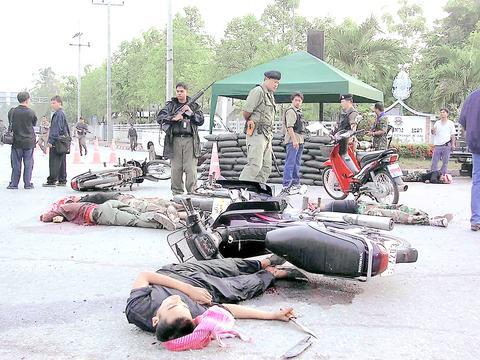Police gunned down scores of machete-wielding militants who stormed more than a dozen security outposts yesterday, the bloodiest day of fighting yet in Thailand's troubled Muslim-dominated south. The death toll stood at least 112.
Only five security personnel were among the dead. The rest were insurgents, mostly teenagers.
The eight hours of mayhem ended when police fired tear gas and rocket-propelled grenades into a mosque, killing 32 militants who witnesses said had been sheltering inside after running away from an earlier battle.

PHOTO: REUTERS
Television news reports showed the bodies of suspected Islamic fighters lying in pools of blood, some of them in front of police stations clasping machetes and wearing colored shirts and camouflage pants.
Gunfire echoed as armored personnel carriers cruised deserted village streets and commandos moved through the forest. Policemen and soldiers carrying automatic rifles crouched as they ran across roads and ditches.
No group claimed responsibility for the highly coordinated assault by possibly hundreds of young militants, although past violence has been blamed on separatists seeking to carve a homeland in the Muslim-majority south of this predominantly Buddhist country.
The death count was dramatically lopsided.
Army chief General Chaiyasith Shinawatra told reporters that 107 insurgent were killed and 17 were arrested. He said three policemen and two soldiers were also killed while 15 policemen were wounded.
Soldiers and police -- tipped off in advance -- were waiting for the poorly armed assailants. Some had guns but most carried only machetes, said Lieutenant General Proong Bunphandung, the chief of police for the south.
"The security officers have been patiently working with local people and gathering intelligence. We waited for the right time to achieve this success," he said.
Many parts of the region have been under martial law for months. Security was tightened yesterday along the border with Malaysia, which has in the past denied allegations of harboring militants.
The violence erupted at 5am when the insurgents attacked more than 15 police bases, village defense posts and district offices in Yala, Pattani and Songkhla provinces in a bid to steal weapons.
It was the worst bloodshed seen in the south where almost daily attacks by gunmen have left nearly 160 people dead this year, including yesterday's toll.
"Most of the dead insurgents are youths of ages ranging from 15 to 20, but two of the leaders are aged about 50 and 60," Proong said, adding that four of the militants were taken alive.
Prime Minister Thaksin Shinawatra said the raids were linked to a Jan. 4 attack on a military camp in nearby Narathiwat province, which triggered an upsurge of violence in the area this year. Four soldiers were killed and hundreds of guns stolen in that raid.
However, Thaksin denied the attackers had connections to international terrorists.
"Most of the insurgents are youths from the southern provinces," Thaksin said. "Their acts are not linked with international terrorists."
He said the attackers intended "to rob guns from defense volunteers and district offices, but our troops were well prepared for that."
"They arrived at the target point with brand new motorcycles. This proves they got financial support from influential figures, including politicians and drug gangsters," he said.

MAKING WAVES: China’s maritime militia could become a nontraditional threat in war, clogging up shipping lanes to prevent US or Japanese intervention, a report said About 1,900 Chinese ships flying flags of convenience and fishing vessels that participated in China’s military exercises around Taiwan last month and in January last year have been listed for monitoring, Coast Guard Administration (CGA) Deputy Director-General Hsieh Ching-chin (謝慶欽) said yesterday. Following amendments to the Commercial Port Act (商港法) and the Law of Ships (船舶法) last month, the CGA can designate possible berthing areas or deny ports of call for vessels suspected of loitering around areas where undersea cables can be accessed, Oceans Affairs Council Minister Kuan Bi-ling (管碧玲) said. The list of suspected ships, originally 300, had risen to about

DAREDEVIL: Honnold said it had always been a dream of his to climb Taipei 101, while a Netflix producer said the skyscraper was ‘a real icon of this country’ US climber Alex Honnold yesterday took on Taiwan’s tallest building, becoming the first person to scale Taipei 101 without a rope, harness or safety net. Hundreds of spectators gathered at the base of the 101-story skyscraper to watch Honnold, 40, embark on his daredevil feat, which was also broadcast live on Netflix. Dressed in a red T-shirt and yellow custom-made climbing shoes, Honnold swiftly moved up the southeast face of the glass and steel building. At one point, he stepped onto a platform midway up to wave down at fans and onlookers who were taking photos. People watching from inside

Japan’s strategic alliance with the US would collapse if Tokyo were to turn away from a conflict in Taiwan, Japanese Prime Minister Sanae Takaichi said yesterday, but distanced herself from previous comments that suggested a possible military response in such an event. Takaichi expressed her latest views on a nationally broadcast TV program late on Monday, where an opposition party leader criticized her for igniting tensions with China with the earlier remarks. Ties between Japan and China have sunk to the worst level in years after Takaichi said in November that a hypothetical Chinese attack on Taiwan could bring about a Japanese

The WHO ignored early COVID-19 warnings from Taiwan, US Deputy Secretary of Health and Human Services Jim O’Neill said on Friday, as part of justification for Washington withdrawing from the global health body. US Secretary of State Marco Rubio on Thursday said that the US was pulling out of the UN agency, as it failed to fulfill its responsibilities during the COVID-19 pandemic. The WHO “ignored early COVID warnings from Taiwan in 2019 by pretending Taiwan did not exist, O’Neill wrote on X on Friday, Taiwan time. “It ignored rigorous science and promoted lockdowns.” The US will “continue international coordination on infectious